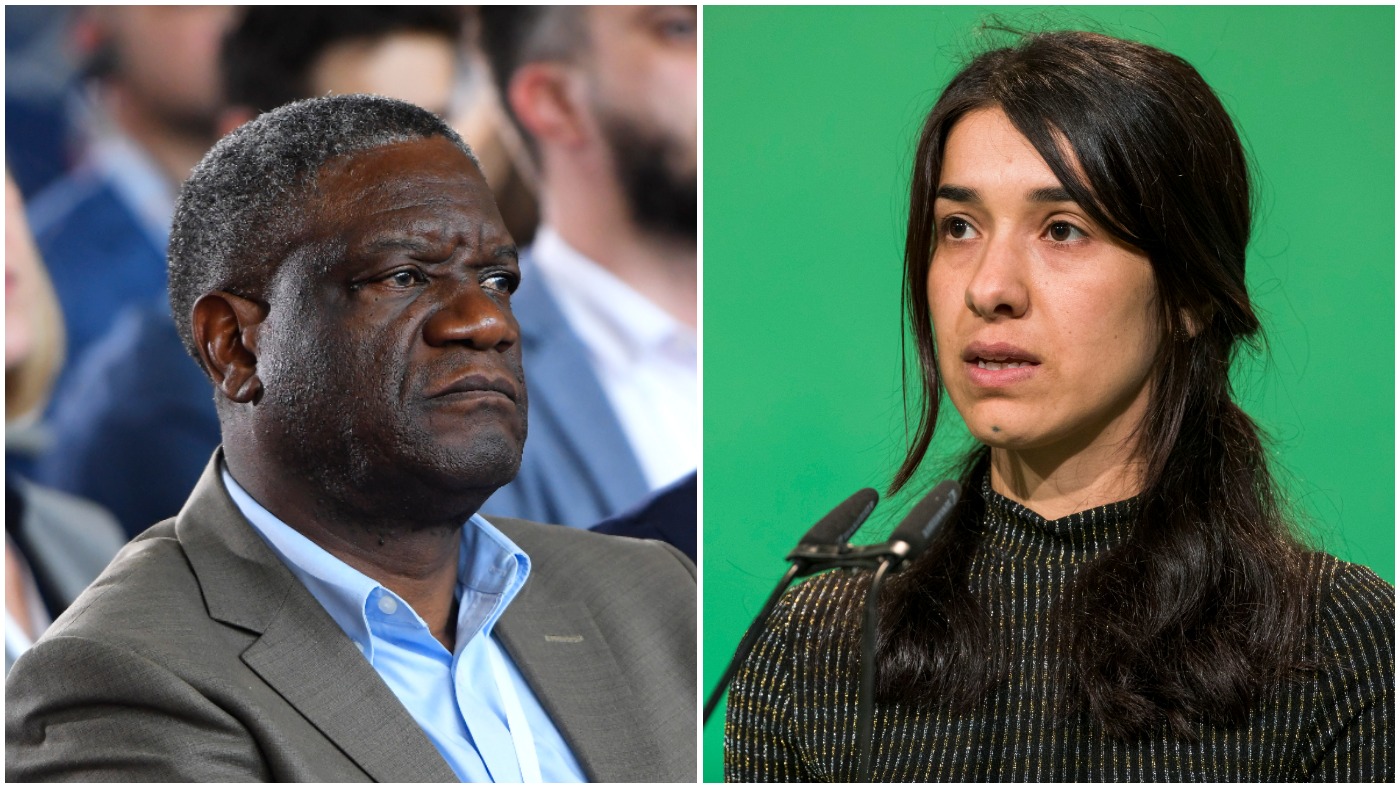Nobel Peace Prize: anti-rape activists Nadia Murad and Denis Mukwege win 2018 award
Bookies had tipped Kim Jong Un to get the honour

A free daily email with the biggest news stories of the day – and the best features from TheWeek.com
You are now subscribed
Your newsletter sign-up was successful
The 2018 Nobel Peace Prize has been awarded to two campaigners against rape in warfare, Nadia Murad and Denis Mukwege.
The award was handed to the pair at a ceremony in Oslo on Friday morning.
Murad is an Iraqi Yazidi who was tortured and raped by militants connected to Islamic State. After escaping from her captors, she “became the face of a campaign to free the Yazidi people”, a Kurdish religious minority, the BBC says.
The Week
Escape your echo chamber. Get the facts behind the news, plus analysis from multiple perspectives.

Sign up for The Week's Free Newsletters
From our morning news briefing to a weekly Good News Newsletter, get the best of The Week delivered directly to your inbox.
From our morning news briefing to a weekly Good News Newsletter, get the best of The Week delivered directly to your inbox.
Mukwege is a Congolese gynaecologist who has treated tens of thousands of victims after setting up a “world-class facility to treat survivors of sexual violence” in the city of Bukavu, in eastern Democratic Republic of the Congo, CNN reports.
The two prize winners are being honoured for their “efforts to end the use of sexual violence as a weapon of war” and for their “crucial contribution to focusing attention on, and combating, such war crimes”, said Norwegian Nobel Committee chair Berit Reiss-Andersen.
The Guardian notes that Mukwege had been “tipped to win for many years”, having appeared on the shortlist regularly for about a decade.
The newspaper’s editor, Katharine Viner, applauded his win in a tweet, describing him as “one of the greatest men alive”.
A free daily email with the biggest news stories of the day – and the best features from TheWeek.com
Mukwege and Murad were also congratulated by European Council President Donald Tusk and by BBC Persian’s Nafiseh Kohnavard, who met Murad after she had escaped from her Isis captors.
Previous recipients of the Nobel Peace Prize have ranged from humanitarian activists to inventors and statespeople. This year bookies had tipped a somewhat controversial figure to claim the award.
According to multiple news outlets, North Korean dictator Kim Jong Un was the favourite to become the next Nobel Peace Prize laureate alongside South Korean president Moon Jae-in, for their role in de-escalating tensions between the two nations and paving the way for the first ever summit between North Korea and the US.
According to the website Oddschecker, which gathers odds from across betting platforms, Kim and Moon were leading contenders in the run-up to the ceremony, with many betting sites predicting a greater than 50% chance of a win for Kim.
That theory was met with a mixed response.
“Twelve months ago the North Korean leader’s name being mentioned in contention for the award would have seemed absurd - but after months of escalating rhetoric on nuclear weapons, economic sanctions and threats of war, Mr Kim and Mr Moon made history with their summit,” said ABC News.
Not everyone was convinced. In an article in The Washington Post article titled “Dear Nobel Committee: Don’t even think about giving a prize to Kim Jong Un”, journalist Isaac Stone Fish wrote: “Kim’s crimes against his own people should disqualify him for a prize awarded to those who ‘have conferred the greatest benefit to humankind’. More importantly, the Nobel Committee would be singling out Kim for reducing tensions that he mostly caused in the first place.”
-
 The Olympic timekeepers keeping the Games on track
The Olympic timekeepers keeping the Games on trackUnder the Radar Swiss watchmaking giant Omega has been at the finish line of every Olympic Games for nearly 100 years
-
 Will increasing tensions with Iran boil over into war?
Will increasing tensions with Iran boil over into war?Today’s Big Question President Donald Trump has recently been threatening the country
-
 Corruption: The spy sheikh and the president
Corruption: The spy sheikh and the presidentFeature Trump is at the center of another scandal
-
 US, Russia restart military dialogue as treaty ends
US, Russia restart military dialogue as treaty endsSpeed Read New START was the last remaining nuclear arms treaty between the countries
-
 What happens now that the US-Russia nuclear treaty is expiring?
What happens now that the US-Russia nuclear treaty is expiring?TODAY’S BIG QUESTION Weapons experts worry that the end of the New START treaty marks the beginning of a 21st-century atomic arms race
-
 Epstein files topple law CEO, roil UK government
Epstein files topple law CEO, roil UK governmentSpeed Read Peter Mandelson, Britain’s former ambassador to the US, is caught up in the scandal
-
 Iran and US prepare to meet after skirmishes
Iran and US prepare to meet after skirmishesSpeed Read The incident comes amid heightened tensions in the Middle East
-
 Israel retrieves final hostage’s body from Gaza
Israel retrieves final hostage’s body from GazaSpeed Read The 24-year-old police officer was killed during the initial Hamas attack
-
 China’s Xi targets top general in growing purge
China’s Xi targets top general in growing purgeSpeed Read Zhang Youxia is being investigated over ‘grave violations’ of the law
-
 Panama and Canada are negotiating over a crucial copper mine
Panama and Canada are negotiating over a crucial copper mineIn the Spotlight Panama is set to make a final decision on the mine this summer
-
 Why Greenland’s natural resources are nearly impossible to mine
Why Greenland’s natural resources are nearly impossible to mineThe Explainer The country’s natural landscape makes the task extremely difficult